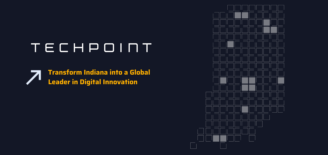Tech Innovation of the Year Nominees Are Focused on Saving Lives, Time & Money and Clearing Pathways To Improve Hoosier Lives
Innovation is more than a buzzword in Indiana tech circles. It’s commonplace for companies large and small. Winners of the 2024 Mira Award for Innovation rise above the routine with Research and Development efforts and other trailblazing discoveries to become groundbreaking products with significant potential to transform a product category or an entire industry.
SIMBAChain won this award in 2023, then named the Tech Product of the Year in recognition of its blockchain-as-a-service (BaaS) platform, which has been compared to WordPress due to its ease-of-use in quickly creating blockchain-distributed applications for iOS, Android, and the web.
TechPoint and its judges were heartened to see this category was among the most popular for early entries and nominations this year because it shows the vibrancy of Indiana’s tech sector, where innovations are occurring in every sector and every corner of the state. After reviewing each of the 27 entries and making difficult decisions, 11 finalists emerged.
Like all Mira nominee innovation stories, we skim the surface to bring you the highlights of each based on their original entry forms. There is much more to each story, and we invite you to follow each company to learn more as they continue to change the landscape of their individual subsectors.
The 2024 contenders for the 2024 Tech Innovation of the Year are:
120Water, Zionsville: In January 2023, about 500 of the nation’s 55,000 water utilities were licensed to use the 120Water platform to manage their drinking water quality compliance efforts. By December, more than 5,000 additional utilities had secured licenses. Ninety-three percent of these utilities serve populations of 10,000 or less, and 85 percent have three or fewer employees. They must comply by October 2024 with U.S. Environmental Protection Agency lead and copper rules that require them to report the material of pipes they use to deliver water and to start removing those made of lead. In 2023, the company developed the “120Water State Dash,” a SaaS platform for state regulators administering federal rules to glean real-time insight into the utilities’ compliance progress. Without a standard digital option, most 55,000 utilities would have had to submit their data via Excel spreadsheets. 120Water’s platform also enables states to procure licenses for a public water system (PWS) portal for every utility in their state. Only 30 of Indiana’s 1,500 water utilities had adopted the 120Water’s PWS Portal Platform. Still, with the state’s adoption of the 120Water system, the others were added, and many upgraded to a pro-level platform. Five additional states have chosen 120Water State Dash, and more are in the procurement pipeline. Modernizing this process will streamline compliance and make the data more easily accessible to the public.
Adverank, Zionsville: Self-storage operations lose more than $30 billion a year due to high vacancy rates, according to a Cushman & Wakefield study. Adverank is the first-ever PropertyTech (Proptech) SaaS solution that caters to the needs of these real estate investors and operators trying to solve that vacancy-rate issue. Adverank optimizes Google Ads campaigns to reduce Cost-Per-Click costs, offering sophisticated approaches and tangible results. The company’s proprietary algorithm, driven by property management systems and Google Ads data, efficiently ranks facilities based on advertising needs, enabling swift decision-making and daily campaign adjustments. Adverank is on a mission to revolutionize the self-storage landscape. The company’s pioneering solutions aim to empower self-storage businesses and drive their prosperity.
ArcticRx, Fishers: ArcticRx developed a storage pod that can be used to deploy supplies, food, and pharmaceuticals and serve as a long-term freezer in communities struck by natural disasters, war, or power grid challenges. The product is about the size of an American dishwasher. It uses a cooling agent to maintain a stable temperature for weeks. The pod can be opened and closed for extended retrieval times with minimal impact on the internal temperature stability. It also offers a protected pocket for an IoT platform space compatible with existing data trackers. The device can be sent worldwide on any transportation mode, which reduces handling costs, eliminates refrigerated trucking (thus reducing carbon footprint), and serves as an immediate on-site storage system. Because it keeps products at a stable temperature for weeks, it reduces waste, but it will also last for years and is easily maintained.
Compact Medical, Inc., Indianapolis: First responders employing cardiac and pulmonary resuscitation (CPR) to save patients’ lives rely on bag-valve-mask (BVM) equipment that uses technology invented in the 1950s to help those patients breathe. The key to success is appropriately providing the right amount of air at the correct pressure for each patient. Out-dated technology provides little assistance to paramedics in gauging those levels. Compact Medical says that omission is related to in-hospital cardiac arrest mortality rates standing at about 75 percent compared to out-of-hospital cardiac arrest mortality rates of about 90 percent. Compact Medical’s Butterfly BVM enables first responders to easily tailor pressure and volume to each patient – whether infants or adults. Further, the company has partnered with the Hope Center, which helps human traffic victims recover, as its manufacturing partner. Company officials see great synergy in helping Hope Center residents reclaim their lives while building devices that could help save lives throughout the country.
Folia, Bloomington: In today’s fast-paced, digital work landscape, finding a place to jot down thoughts is difficult and prevents teams from developing their best insights crucial to high-quality work and innovation. Folia created disruptive technology to change how people work through digital annotation, offering a comprehensive platform to optimize document review, foster collaboration, and empower users across devices. The company has a research and development partnership with a global client, which validated its hypothesis and helped it fine-tune its solution through user feedback from organizations worldwide and the U.S. government. Industry giants have endorsed Folia’s work and will actively partner with the company for its official product launch. A significant communications company selected Folia as a marquis software partner supporting the launch of new products. Folia was also invited to a global company’s developer conference as an esteemed software partner and is working on a significant project with that company.
hc1, Indianapolis: Federal officials predict a 22 percent increase in demand for medical and clinical laboratory technologists and technicians by 2025, even as 73 percent of labs report understaffing and a continuing burden on lab professionals to do more with less. For over a decade, hc1 has been the leader in identifying real-time insights and risk signals from complex laboratory data and empowering thousands of laboratories to leverage their data insights to optimize operations and inform testing and treatment decisions for millions of patients. The company put its experience and understanding of lab challenges to work to develop the AI-assisted hc1 Workforce Optimization,™ a one-of-a-kind solution that helps labs sufficiently staff to meet volume demands while decreasing turnover and burnout caused by understaffing, minimize send-out testing and short-term staffing costs; and meet testing turnaround time benchmarks. hc1 uses labs’ historical test volume and Human Relations data to predict demand for lab services and identify potential staffing issues before they arise. The tool saves labs hundreds of thousands of dollars in labor costs annually.
Indiana Department of Workforce Development (DWD), Indianapolis: The state has many programs to help Unemployment Insurance claimants upskill, reskill, and change jobs, but it can be difficult for users to find the right starting point. “Pivot” simplifies the process, helps job seekers explore opportunities, and helps them get the training or education necessary to advance their careers. Pivot leverages the Indiana Statewide Longitudinal Data Systems (SLDS) to provide a powerful data set linking education and workforce outcomes. At its core, Pivot is a recommender system with hybrid filtering trained on the SLDS data. It goes beyond offering links to ob opportunities to provide pay scale and suggest training options based on the user’s background. Users grade their interest in job options and can give additional feedback to help Pivot curate future suggestions. In the 26 weeks since its launch, users have interacted with Pivot nearly 18,000 times. DWD anticipates the tool can be used by other state agencies as well.
Novilytic, LLC, West Lafayette: Novilytic uses its nanotechnology -“Proteometer-L Kit” – like a “canary in the coal mine” for pharmaceutical drug fermentors. The kit enables enhanced federal compliance, saving money and, potentially, lives. Conventional drug development and manufacturing testing processes require manual sampling and long tests using a mass spectrometer, a complex and fragile instrument. That process can take hours or days, but it only takes one to two hours of bad broth for a batch to be ruined or to develop significant contamination. At that point, additional filtering and purification of the drug is required before making pills or syringe solutions. A single batch of bio-based medicines costs up to $20 million to make – most of that cost is in purifying dirty batches. The Proteometer-L kit performs at-line, real-time batch analysis roughly every 10 minutes. The product is sold as consumable kits that are plug-and-play with instruments already present in all medicine-making laboratories, ensuring easy adoption of almost all of the more than 250,000 currently used instruments used in the pharmaceutical industry.
Recovery Force Health, Fishers: The Recovery Force Health Movement and Compressions (MAC) System is a groundbreaking innovation focused on Sequential Compression Devices (SCDs), traditionally tether patients with cumbersome cords/tubes and noisy pumps. SCD technology has remained unchanged for more than 30 years. The MAC System, coupled with real-time mobility tracking, is a tubeless, cordless, non-pneumatic compression device for deep vein thrombosis (DVT) prevention. The device’s screen displays invaluable insights: how long the patient has been in bed, upright, and how many steps they’ve taken. This data is compared today vs. yesterday, and it helps patients and caregivers see progress. In addition to being a third of the size of the current standard of care SCDs, less noisy, more comfortable, and cordless/tubeless, the MAC System can unveil previously invisible data. Caregivers can access real-time information about a patient’s mobility, eliminating the guesswork involved in traditional care. The company’s clinical trials demonstrated a 205 percent average increase in compliance (wear time) and heightened patient and staff satisfaction.
RxLightning, New Albany: Soaring healthcare costs in U.S. healthcare have placed a significant portion of the population in financial distress. RxLightning addresses that issue with its Affordability Module, which streamlines specialty medication access and affordability. Unemployment-related insurance losses, high-deductible plans, and the exorbitant costs of specialty medications for critical conditions like cancer and organ transplants often burden patients with the choice between significant debt or forgoing necessary treatments. The Affordability Module automates and centralizes the identification and application process for grants, discounts, and free drug programs, breaking down the silos that exist in current healthcare affordability solutions. The module’s automation, decision-making capabilities, and integration with electronic health records represent a paradigm shift in healthcare technology. It compares discount programs to grant programs, recommends the best option for the patient, and decides next steps based on a variety of factors.
Valgotech, LLC, Fishers: Valgotech develops and commercializes made-in-the-USA, lightweight advanced battery systems for the aerospace and defense industries. Its new battery technology uses low-cost and readily available sulfur as the cathode in place of expensive materials like nickel, cobalt, and manganese, which are used in lithium-ion batteries. Valgotech’s technology will reduce U.S. dependence on foreign-sourced battery materials and batteries. Valgotech has also developed a proprietary, solvent-free cathode and solid-state electrolyte manufacturing process that reduces battery cathode fabrication by up to 15 times that of conventional processes. Eliminating toxic solvents, like N-Methyl-2-pyrrolidone, more commonly known as NMP, makes the battery manufacturing process more eco-friendly and cheaper. Valgotech plans to establish a manufacturing facility in Indiana and be a global battery supplier for the aerospace and defense industries. Among those supporting the venture are the National Science Foundation’s highly competitive STTR, the U.S. Air Force, the U.S. Army, the Indiana Economic Development Corporation and Elevate Ventures.
Award winners will be announced at the 25th annual TechPoint Mira Awards gala on Friday, April 26, 2024, at the Old National Centre in Indianapolis. The event is presented by the Indiana Economic Development Corporation, Salesforce, and a host of the state’s most innovative companies, universities, and organizations. See that growing list, learn more, and get your tickets here.




